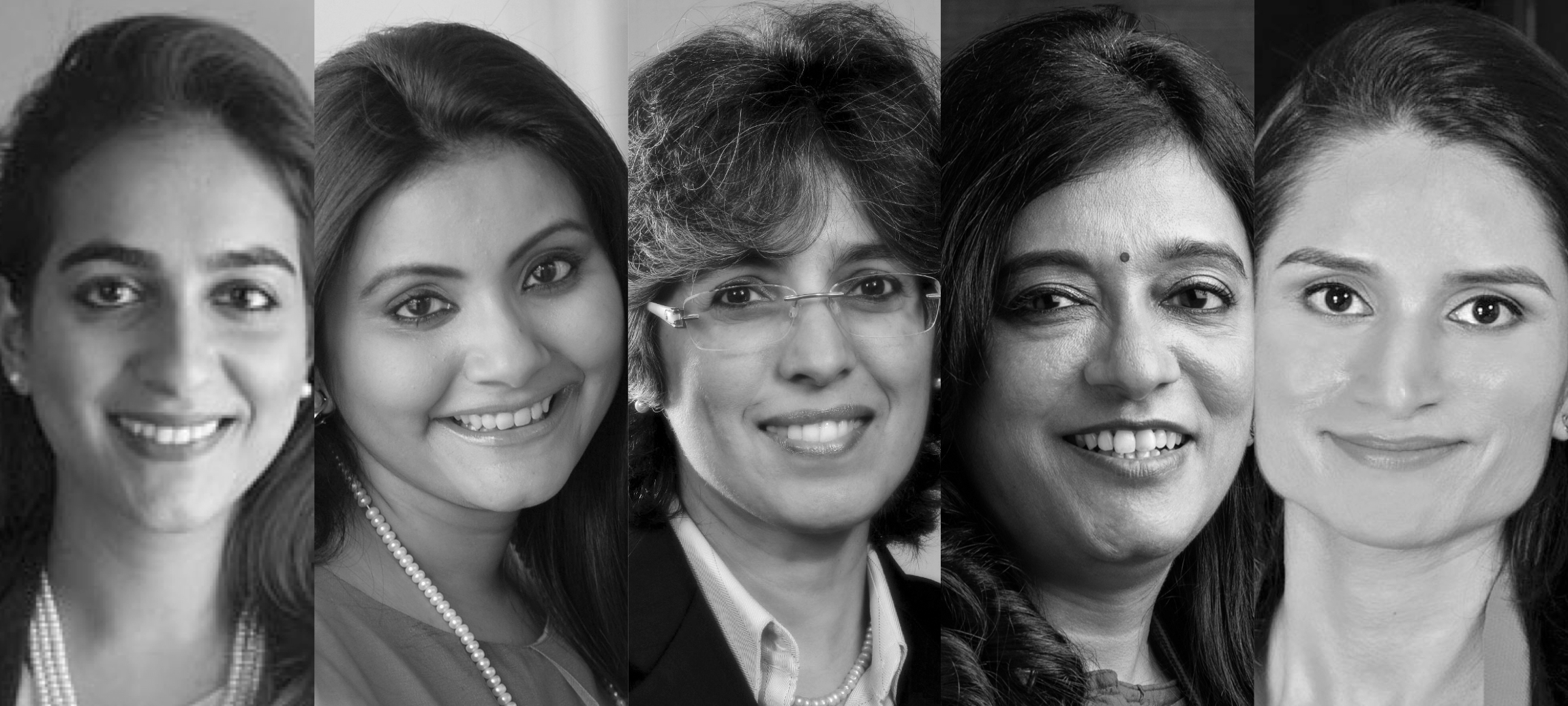Daughters of Legacy by Rinku Paul and Puja Singhal tells the stories of twelve successful women who grew up with strong business lineages.
Chosen from a wide cross section in terms of scale of business, roles and hierarchy, these women have not only kept the legacies alive but also gone on to carve a niche for themselves as individuals beyond their famous last names. Clearly for all of them legacy is far more than mere inheritance.
Let’s meet 5 of these Daughters with a Legacy and take a look at some of the key moments in their business life.
1. Meher Pudumjee
Non-executive Chairperson, Th ermax Global, a leading energy and environment engineering company.

2. Priti Sureka
Whole-time Director, Emami Limited

3. Tara Singh Vachani
Managing Director, Antara Senior Living; Nonexecutive Director, Max India Limited

4. Bhairavi Jani
Executive Director, SCA Group with business interests in warehousing, supply chain technology, cargo handling and freight forwarding and shipping.

5. Divya Modi Tongya
Co-founder, Smart Global Group (previously Spice Global), that has interests in telecommunications, healthcare, finance and real estate.


Tag: puja singhal
6 books You Should Read This Navratri
Navratri is a celebration of womanhood and the different forms of a woman. The various goddesses in Hinduism embody different ideals.
Here’s a list of 6 books to celebrate the power of women, this Navratri
Like Durga with her ten arms defeated Mahishasura on the battlefield, Sudha Menon’s book Devi, Diva or She-Devil explores the plethora of challenges women face in the professional world and deal with them.
Step Up : How Women Can Perform Better For Success

In an effort to help women achieve the ultimate goal in their personal and professional space, author Anju Jain in Step Up elucidates practical techniques in a simple matrix for women to become successful. The book features interviews with key figures such as Kiran Mazumdar Shaw (Biocon), Sonia Singh (NDTV), Devyani Rana (Caterpillar), Geetu Verma (Unilever) which shows how the modern day woman embodies Goddess Shakti and triumphs over personal and professional arenas.
Millionaire Housewives

In this book, the authors explore the lives of 12 enterprising homemakers who in spite of having no past experience in business, managed to build successful empires through their ambitious zeal for work, defying all stereotypes. Extending their good luck charm in business, they are the Lakshmis of the house who embody prosperity and wealth.
Kali
Seema Mohanty traces the evolution of the Goddess Kali in her book The Book of Kali. The goddess confronts the world in her unconventional persona – challenging the orthodox ideas of divinity. This book highlights the various forms and rituals associated in which the goddess is worshipped.
Jaya

In a modern re-telling of the Mahabharata, Devdutt Patnaik’s book Jaya not only features 250 line illustrations, it also includes women’s stories, other than Draupadi’s such as Satyawati, Kunti, Gandhari). The ending is not what one would expect, and almost is the sole reason why the book was originally called Jaya by Vyasa.
Sita
History has romanticised Rama at the cost of marginalizing the role that Sita played in ‘The Ramayana’. Devdutt Pattanaik’s book Sita re-imagines the world of Sita. It emphasizes on the fact that though portrayed as a submissive character, Sita was a woman of mighty demeanor and strength.
Which book are you reading this Navratri?
When the Going Gets Tough, the Tough Gets Going: An Excerpt from ‘Millionaire Housewives’
Twelve stories of ordinary women who achieved extraordinary things out of sheer will and determination come together in Rinku Paul and Puja Singhal’s ‘Millionaire Housewives’, to inspire readers to achieve anything one wants to.
One such story is that of the well-known make-up artist Ambika Pillai. There is a monumental struggle that went behind the glitter and glamour of her life that we see today. Displaying unbridled courage when the going got tough, the story of Pillai is one to stay with us forever.
Here is an excerpt of her story from the book, ‘Millionaire Housewives’:
At the tender age of seventeen, my life took a decisive turn when a prospective groom came to see me. I didn’t even know his name. The one thing about him that impressed me though was his impeccable English. He had an MBA degree, was a gold medallist no less, and I gave up my world without any reservations to follow him to his. The excitement didn’t last long though. Despite his seemingly bright prospects, the reality check arrived as soon as I moved in with him to a tiny single-room apartment in Calcutta, a far cry from my sprawling home in Kerala. I was expected to wear a saree, be up at 5 a.m., cook, clean—things that I had never done before. I didn’t protest, refusing to let any of this affect me since I wanted to make my marriage work. I began to take many other things in my stride; being made to feel that I was not good enough on account of my lack of education was only one of them. I would have lived with all of this, but ours really wasn’t a marriage at all.
Not once in five years did we have a physical relationship. It was hard to explain this to my parents, who were convinced that my inability to bear a child meant there was something medically wrong with me. Trips to doctors, medical tests and even surgeries were my lot as I found it very hard to tell my parents the real issue with my marriage. I had to literally beg my husband to have a child and, thankfully, my daughter, Kavitha, was born after five years of marriage. If I had thought that a child would improve matters, I was living in a fool’s paradise as things started going from bad to worse.
Finally, with a two-year-old child in tow, I mustered up the courage to walk out of my seven-year-old marriage. I went back to my parents’ place. In retrospect, those seven years were one of the scariest times of my life. Kids should not get married as young as I did; at that age, you don’t even know your own mind, forget the other person’s. From wanting to be a happy housewife to coming back to my parental home in the throes of depression, I had come a long way. I had spent the last seven years of my life in a loveless relationship and had absolutely nothing to fall back on. If there was one thing I was grateful for, it was Kavitha. In fact, till this day, if anyone asks me if I regret my marriage, my answer is a vehement no, only on account of my daughter.
I just had no idea what I would do next. In my seven years of marriage, I hadn’t acquired any skills that could stand me in good stead. While my parents were supportive, my dad’s suggestion of letting him ‘look after’ my child and me financially didn’t go down well with me. With my other sisters married by then, I remember asking my father if I could help him with his cashew business—wanting to become the son he had never had. His answer, however, was a resounding ‘no’ as he felt it wasn’t a woman’s job. He couldn’t picture his daughter socializing with his many customers—a part and parcel of his cashew export business.
Never in my life had I felt like such a total loser. I wanted to stand on my own feet, but in the absence of any skills, I saw all doors closing in on me. In my desperation, I even came up with naive options like selling T-shirts on the beaches of Goa, where my lack of education would not be a deterrent. It was on one such day, when I was feeling totally dejected, that I saw an advertisement by Shahnaz Hussain in the local newspaper, inviting students for a hairstyling course in New Delhi. I made up my mind to join it. More than anything else, my decision was based on the fact that being a beautician didn’t require me to be a graduate. My father, of course, was devastated by the idea of me stepping out of the home turf. My mom tried to buy peace by explaining to my dad that at least I was choosing a ‘woman-oriented’ career and that I would be back home after finishing my course.
I landed in Delhi, a totally unknown city, with my daughter in my arms, utterly terrified of what the future held. I had never lived all by myself before or taken any independent decisions. Yet, here I was, fending for myself, looking for accommodations to rent. The problem was further compounded by the fact that I didn’t speak any Hindi. Irrespective of the many problems staring me in my face, I knew that there was no turning back now. I had to do this—more for my daughter than anyone else. While Delhi now feels like home, in those days I was a rank outsider. I remember people calling me ‘kali kaluti (dark complexioned)’. Of course, the saving grace was that since I didn’t know the language, I couldn’t quite understand what it meant. I somehow held on, and managed to finish two beauty courses.
Upon finishing my courses, although my parents were keen that I return home, I took up a job at a small two-seater parlour, which paid me Rs 2000 per month. I paid Rs 1000 as house rent and tried to stretch the balance to take care of my child. Money was something I never had to worry about in the past and these were trying times to say the least. While my father had paid for my courses, I was now determined to seek minimal financial help from him. I remember trying to save money from the measly Rs 1000 I had left after paying rent in order to buy a moped bike that would make commuting easier. Today, if one of my staff members tells me that they want to leave because they have a better offer, I never hold them back for I have witnessed the struggle for money first-hand.
The one bright spot of my life throughout this period remained my daughter, who was three years old by then and had just about started school. I remember telling Kavi stories of my own childhood—how I visited Disneyland when I was thirteen years old and how I would ensure that she did the same, although I had no clue how I would fulfil this promise.
Grab your copy of ‘Millionaire Housewives’ now!













